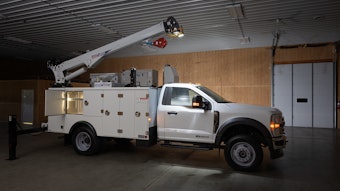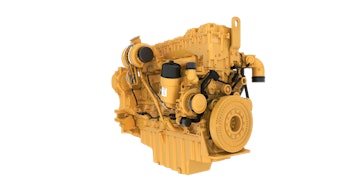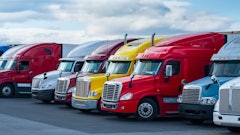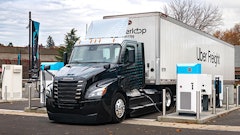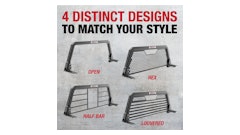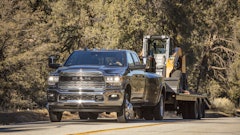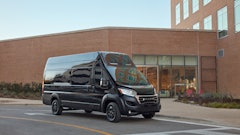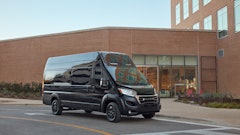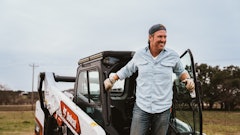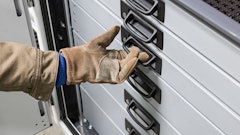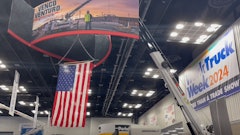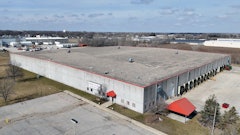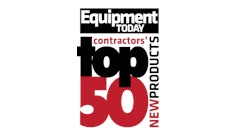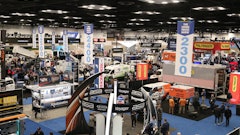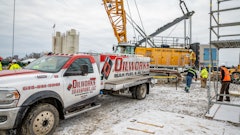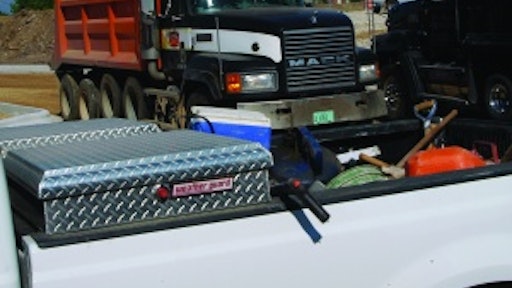
A pickup can serve as useful portable tool storage, but it's important to consider its limitations. Take into account the gross vehicle weight rating (GVWR) and gross combined weight rating (GCWR). The GVWR is the total allowable weight of the vehicle when loaded, including the weight of the pickup plus fuel, cargo, passengers and trailer tongue weight. The GCWR is the maximum allowable combined weight of the pickup plus fuel, cargo, passengers, trailer and trailer load. You don't want to exceed either of these limits.
Once you're ready to outfit your pickup, one of the first items to consider is a bed liner. Tools and building supplies can quickly beat up an unprotected box, with rust and corrosion attacking the exposed metal. A bed liner not only prevents a lot of premature wear, it can also increase resale value.
Next, consider how to organize tools for ease of access. Neathamer Surveying Inc. certainly understands the importance of accessibility. Its employees need quick access to a variety of materials and tools carried in its Ford F-250 crew cab pickups.
"We easily have 1,000 lbs. of gear in there," says Cory Neathamer. This includes multiple tripods, shovels, big iron rods, level detectors, wooden hubs, different sizes of lathes, rebar for setting property corners, safety gear and surveying guns.
The crew cabs come in handy for the added storage capacity. "We carry the guns inside cases stored inside the cab," says Neathamer. "We keep those pretty close to the employees." Almost everything else is stored in Highway Products Pickup Packs. "We love these [Pickup Packs] because we have different places to put everything."
Neathamer Surveying originally used boxes to hold tools. "They were running around loose in the pickup," Neathamer recalls. "It was a pain to get to the boxes and find the equipment you needed."
The Pickup Packs eliminated some of the past headaches. Employees can now easily access all of their tools. "The whole middle slider pulls out. It just makes it easier to get into things and do it quickly, especially in bad weather," says Neathamer. "They don't have to lean over five other pieces of equipment to get into the middle of the truck, like when I used to be in the field. Plus, when you lock your rig up, you know that it is locked up nice and tight."
The Pickup Packs have been standardized across the fleet. "The reason for that is twofold," says Neathamer. "One is efficiency out in the field. We want to make it quick, easy and safe. The heavy items, such as the rebar, are in a secure location. Everything is sized for what we have in there, so if you have to slam on the brakes, you are not worried about something shooting 5 ft. forward."
Standardization helps in other areas, as well. "It makes it easier when crew members have to switch vehicles. To have them set up the same means it is not a big deal," says Neathamer. "Back in the shop, we do quarterly safety inspections. It is easier for me to do those inspections when I can walk right up to the rig, know where everything is and go through it."
CAPS LIGHTEN THE LOAD
Field techs for oil company Pason Systems U.S.A. operate a fleet of heavily loaded full-size pickups on unmaintained service roads, racking up an average of 50,000 miles a year.
"They are running heavy and they are running off road," says Don Schleicher. The roads see a lot of heavy oil rig equipment, but not much in the way of maintenance. "During the rainy season, these trucks can get buried up to their frame in mud. These trucks work in a nasty environment."
The company makes the best use of its trucks' GVW. However, recent GVW increases announced by pickup manufacturers have enabled Pason Systems to downsize. "We switched over to the Chevy 2500 in 2011 just because of the GVW changes," says Schleicher. "The 2500 in 2011 has a higher GVW than the 3500 had up through 2010. It is not a light vehicle. It is not a '3/4-ton' vehicle. It is 10,000 lbs. GVW with 2,700 lbs. of payload."
Field techs need to ensure they have the parts and tools needed to keep equipment up and running. "Each field tech carries a unique set of inventory based on customer needs," says Schleicher.
Prior to 2011, Pason Systems was upfitting its pickup trucks with a fiberglass insert. "But we were in a hiring frenzy in 2008 and I didn't have time to factory order trucks and do proper upfitting," Schleicher recalls. "So we were buying trucks out of stock. We equipped them through local upfitters and just put A.R.E. Deluxe Commercial Unit (DCU) caps on them, not expecting them to hold up in our environment. I was thinking we would end up with skin cracking and ribs fracturing.
"But these trucks are now going on two years and there have been no major issues," he continues. "We were going to take them back once things settled down and do a proper upfit on them. But they held up."
This is because DCU caps feature a fully welded aluminum inner cage structure with heavy gauge aluminum tubing. The DCU also has more than 200 options, including various door and window configurations, toolboxes and custom ladder carrying configurations. A.R.E. also offers commercial accessories such as the Bedslide sliding cargo tray and Jet Rack interior ladder racks.
Pason Systems also experienced a huge performance advantage. "The redesigned upfit that we use now is exclusively the A.R.E. DCU," says Schleicher. "We save a lot of weight vs. our previous configuration. The redesigned upfit weighs about 600 lbs. Before that, we were probably 300 lbs. heavier. With the Duramax diesel-equipped Chevy 2500 rated at a 2,700-lb. payload capacity, that still offers a little more than 2,000 lbs. for payload."
Because techs also carry computers and other sensitive components that travel better in the cab, the company has began to transition from extended cabs to crew cabs. "That adds 11 in. of cab room and 160 lbs. of curb weight," says Schleicher. But with the weight savings of the A.R.E. DCU, Pason is still able to haul more with its crew cabs than the previous extended cab models.
MOBILE REFUELING
Fuel transfer tanks are a popular option to supply diesel for on-site equipment. For example, Jim Raiser, Gulf Shore Site Development, Naples, FL, is a site development contractor that performs grading and excavation. The company equips its fleet of Ford F-150s, F-250s and F-350s with both toolboxes and fuel tanks. The company also has a larger capacity F-450 that is reserved as a tool truck for the mechanic only.
Fuel transfer tanks come in a variety of sizes, with a maximum legal limit of 119 lbs. before special signage and regulations take effect. If you plan to use a transfer tank, keep in mind that diesel fuel averages approximately 7.1 lbs./gal. Thus, 110 gal. of fuel would weigh 781 lbs. If you assume the tank weighs another 220 lbs., you are now approaching 1,000 lbs. of payload.
Still, it can be worth the weight. Paul R. Lipp & Son Inc., Rogers, OH, has found the tanks to be very efficient for its small and mid-size equipment. "Our operators drive pickup trucks that carry the usual hand tools plus lasers, chop saws, safety equipment, etc.," says Greg Lipp, president. "These trucks are also equipped with auxiliary fuel tanks that mount in the bed of the truck and carry about 90 gal. of off-road diesel." The tanks also include 12-volt electric transfer pumps.
Fuel is purchased in bulk for convenience and consistent traceable quality. It is then transported via pickups to the field. "We average about two machine refuelings per 90-gal. transfer tankful for an 8- to 10-hour shift," says Lipp.
Carrying tools and fuel are only a couple applications made easier by today's seemingly endless supply of pickup truck accessories. Check out ForConstructionPros.com for even more ideas for your vehicles.



